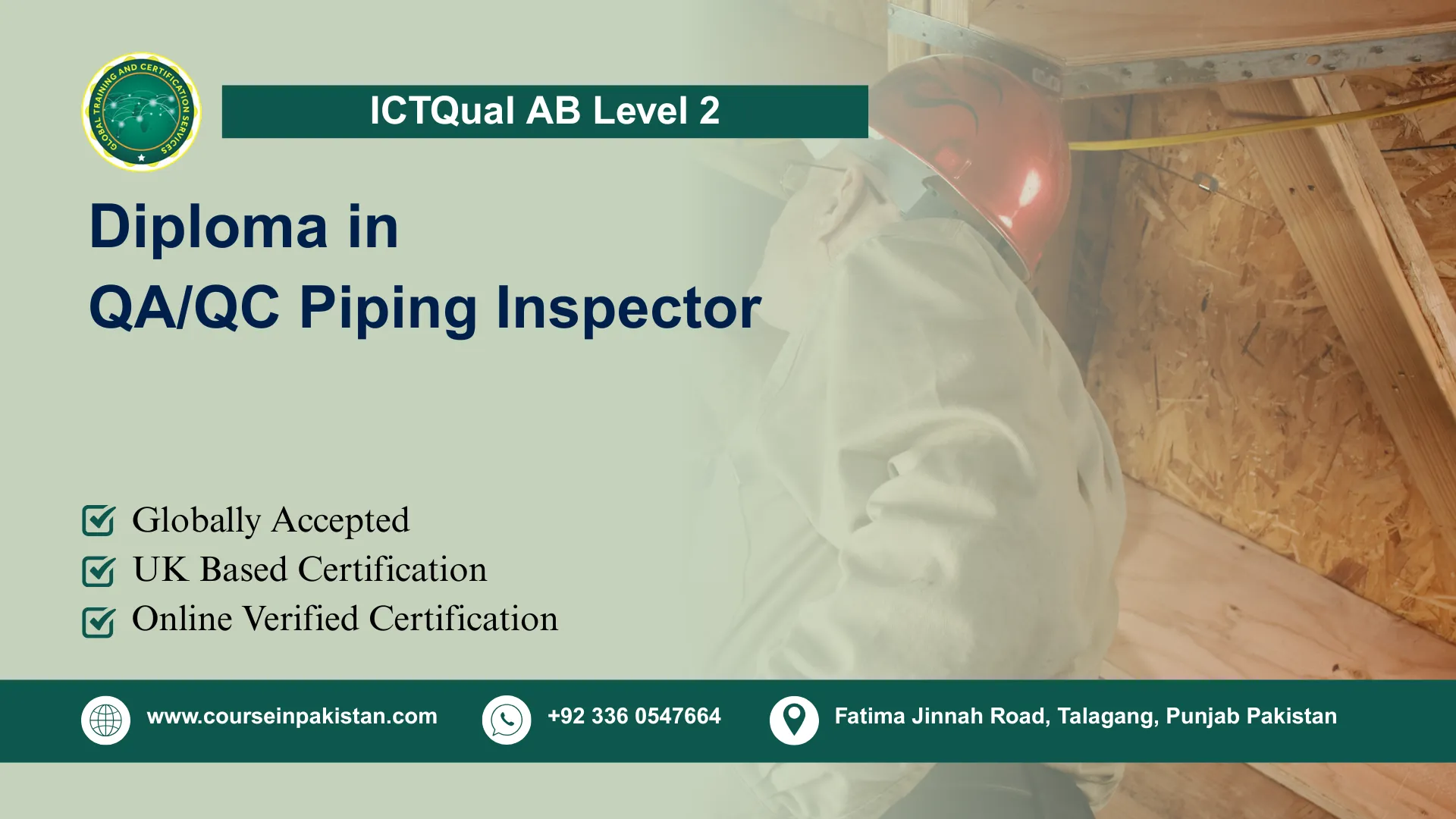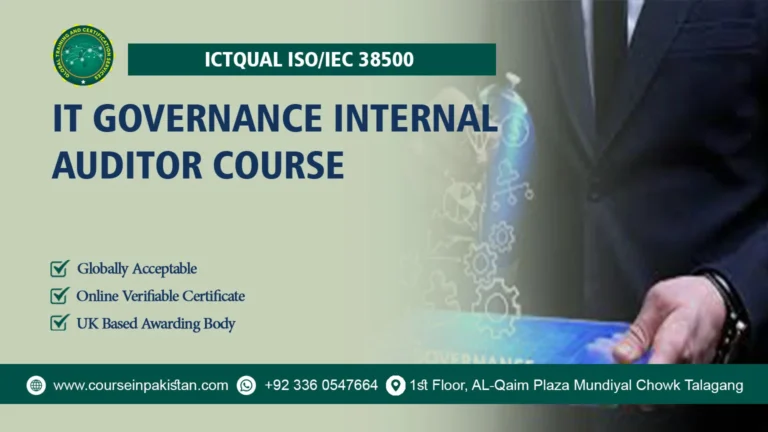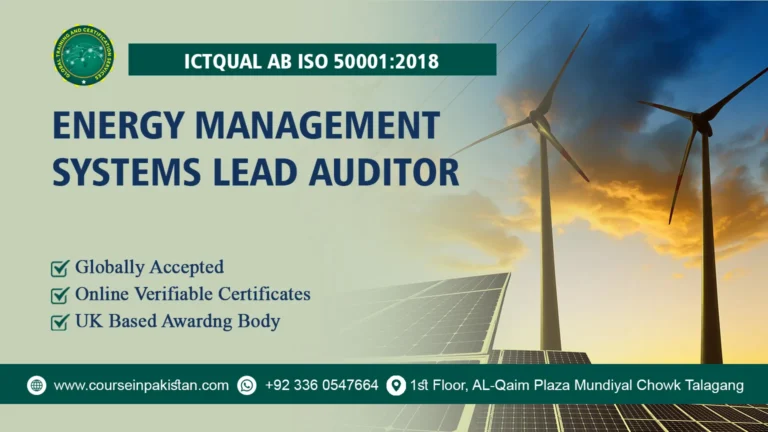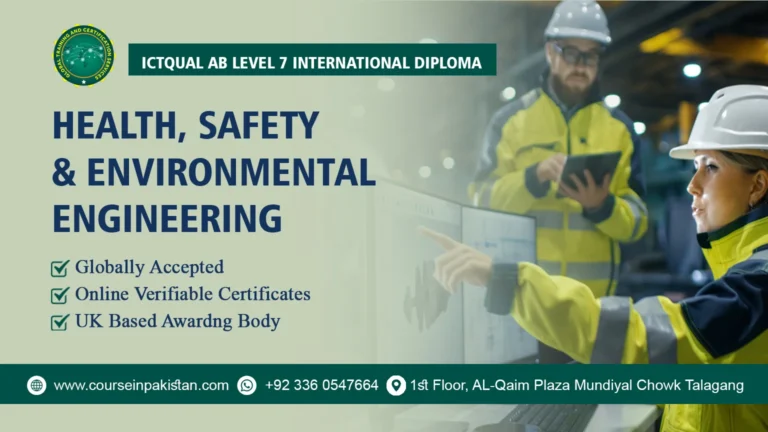
The ICTQual AB Level 2 Diploma in QA/QC Piping Inspector is designed as an early-stage qualification that introduces learners to the foundational concepts of quality assurance and quality control within the piping inspection profession. This course is aimed at individuals who are new to the QA/QC field or those working in industrial environments who want to acquire essential knowledge of inspection practices. It covers the basics of piping components, welding fundamentals, inspection techniques, and documentation processes, ensuring learners understand how QA/QC contributes to safety, efficiency, and compliance in industrial projects.
By focusing on core knowledge and entry-level skills, this qualification prepares learners to develop a strong professional base for future growth. Industries such as oil & gas, petrochemical, power generation, and manufacturing demand competent individuals who can support QA/QC functions. Through this diploma, learners gain exposure to international standards, inspection methodologies, and workplace safety requirements, enabling them to contribute effectively to project quality systems and prepare for advanced qualifications in piping inspection.
Course Overview
The ICTQual AB Level 2 Diploma in QA/QC Piping Inspector offers an accessible pathway for learners to understand the role of inspection in maintaining quality and compliance in piping systems. The curriculum introduces key subjects such as basic interpretation of piping drawings, introductory visual inspection methods, an overview of welding processes, and an introduction to non-destructive testing (NDT) concepts. Learners also explore documentation, traceability, and the importance of quality control principles in supporting industrial operations.
This course provides a balance between theoretical understanding and practical awareness, equipping learners with the confidence to support inspection teams in real project environments. It serves as a stepping stone to higher-level QA/QC diplomas while also providing immediate industry relevance for those starting out in inspection roles. By completing this qualification, learners gain the skills to assist with inspection processes, understand quality documentation, and contribute to compliance monitoring within industrial projects, thereby laying the groundwork for future professional advancement.
Key Highlights of the Course:
- Introduction to piping components, welding basics, and inspection principles
- Foundational training in inspection methods, quality systems, and documentation
- Exposure to international QA/QC standards and industry practices
- Practical insights into supporting inspection teams in industrial projects
- Strong progression pathway to higher-level QA/QC diplomas and certifications
Course Benefits
Starting Statement: The ICTQual AB Level 2 Diploma in QA/QC Piping Inspector provides learners with essential entry-level knowledge and skills that enable them to begin their career journey in quality assurance and inspection.
Foundational QA/QC Knowledge
- Learn the basics of piping inspection, welding processes, and documentation control
- Understand the importance of compliance and safety in industrial projects
- Gain awareness of international codes and standards applied in QA/QC practices
Practical Skills Development
- Acquire introductory inspection and documentation skills to support QA/QC teams
- Develop confidence in understanding drawings, weld symbols, and basic inspection methods
- Learn how to recognize potential defects and understand their impact on project quality
Career Entry Opportunities
- Build the competence needed to secure entry-level QA/QC roles across industries
- Strengthen employability in construction, oil & gas, petrochemical, and power plants
- Gain a qualification that demonstrates readiness to work in quality-related positions
Progression and Growth
- Prepare for higher-level qualifications such as Level 3 and Level 4 QA/QC Diplomas
- Establish a pathway to advanced inspection certifications and specializations
- Lay the foundation for long-term career growth in inspection and quality management
Ending Statement: This diploma acts as a strong entry point for learners aspiring to build a career in QA/QC piping inspection. It equips them with practical knowledge, professional awareness, and the stepping stone needed to progress toward advanced qualifications and career opportunities in global industries.
Course Study Units
This qualification, the ICTQual AB Level 2 Diploma in QA/QC Piping Inspector, consists of 5 mandatory units.
- Advanced Material Receiving & Verification Procedures
- Inspection Tools & Equipment (Gauge, Vernier, Weld Gauges)
- Piping Fabrication & Erection Inspection Techniques
- Hydrostatic/Pneumatic Testing and Flange/Valve Checks
- Inspection Documentation: ITPs, NCRs, Punch‑listing
Learning Outcomes
Starting Statement: The ICTQual AB Level 2 Diploma in QA/QC Piping Inspector is designed to provide learners with fundamental technical skills and practical knowledge to support inspection teams in industrial projects. Upon successful completion, learners will be able to apply essential inspection methods, utilize tools effectively, and contribute to quality assurance systems with competence and confidence.
Advanced Material Receiving & Verification Procedures
- Carry out material receiving checks to ensure compliance with specifications.
- Verify certificates, markings, and documentation for traceability purposes.
- Apply correct procedures for handling and storing piping materials.
Inspection Tools & Equipment (Gauge, Vernier, Weld Gauges)
- Demonstrate the proper use of basic inspection tools such as vernier calipers, gauges, and weld gauges.
- Understand the role of inspection tools in measuring dimensions and tolerances.
- Apply inspection equipment accurately to detect non-conformities.
Piping Fabrication & Erection Inspection Techniques
- Assist in inspecting piping fabrication processes to ensure compliance with drawings and codes.
- Perform fit-up and alignment checks during erection activities.
- Recognize common fabrication and erection defects that affect project quality.
Hydrostatic/Pneumatic Testing and Flange/Valve Checks
- Support hydrostatic and pneumatic testing procedures for piping systems.
- Check flanges, gaskets, and valves for correct installation and integrity.
- Identify safety considerations and reporting requirements during testing activities.
Inspection Documentation: ITPs, NCRs, Punch-listing
- Assist in preparing and maintaining inspection documentation such as ITPs (Inspection Test Plans).
- Report non-conformities (NCRs) in compliance with QA/QC procedures.
- Participate in punch-listing activities to ensure final project readiness.
Ending Statement: By achieving these learning outcomes, learners will gain the ability to perform essential inspection tasks, understand quality documentation, and support QA/QC teams in industrial environments, while building a strong foundation for progression to advanced levels of QA/QC qualifications.
Who is This Course For?
Starting Statement: The ICTQual AB Level 2 Diploma in QA/QC Piping Inspector is specifically designed for individuals who are eager to develop a foundational career in piping inspection and quality assurance. This qualification caters to learners who wish to build technical knowledge and practical inspection skills relevant to industrial projects.
Entry-Level Inspectors and Technicians
- Individuals beginning their careers in piping inspection and fabrication.
- Those aiming to develop fundamental knowledge in QA/QC processes.
- Learners with basic technical or vocational training in engineering fields.
Engineering and Technical Students
- Students pursuing engineering, mechanical, or industrial studies.
- Individuals seeking hands-on skills to complement their academic learning.
- Learners interested in pursuing inspection and quality careers.
Industry Assistants and Helpers
- Helpers, assistants, or junior staff in fabrication yards and construction sites.
- Individuals aspiring to formalize their skills with a recognized qualification.
- Those eager to contribute to QA/QC documentation and inspection processes.
Career Switchers and Fresh Graduates
- Professionals from other fields aiming to transition into the oil, gas, or construction industries.
- Fresh graduates wanting a practical, industry-focused qualification.
- Learners looking to strengthen employability in inspection-related roles.
Ending Statement: Overall, this course is ideal for anyone who wants to establish a solid foundation in piping inspection, build essential QA/QC skills, and progress toward advanced qualifications in quality assurance and industrial project management.
Future Progression
- Progression to ICTQual AB Level 3 Diploma in QA/QC Piping Inspector for deeper technical expertise.
- Eligibility for junior-level roles such as QA/QC Technician or Assistant Inspector in industrial projects.
- Opportunities to support inspection documentation, reporting, and on-site coordination.
- Foundation for developing advanced inspection knowledge in welding, NDT, and quality management systems.
- Enhanced employability in oil & gas, power plants, construction, and manufacturing industries.
Academic Pathways:
- Direct progression to ICTQual AB Level 3 Diploma in QA/QC Piping Inspector.
- Further advancement toward higher-level qualifications, including Level 4 and Level 5 Diplomas in QA/QC.
- Opportunities to complement technical learning with certifications in welding inspection, NDT, and industrial safety.
- A pathway to specialized QA/QC studies in piping, welding, and project quality management.
Conclusion
The ICTQual AB Level 2 Diploma in QA/QC Piping Inspector offers a strong entry point for learners eager to enter the world of industrial inspection and quality assurance. It equips learners with practical skills in inspection tools, documentation, and fabrication checks, ensuring readiness for site-based responsibilities. With its clear progression opportunities and academic pathways, this qualification provides a vital stepping stone toward advanced QA/QC studies and professional roles in high-demand industries such as oil and gas, construction, and power generation.






